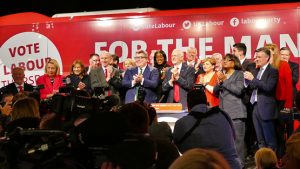By Khadija Khan
Where did it go wrong for Labour?
The party’s strong ties with the towns and cities that were once their heartlands have been slowly weakening over time.
Once, it could count on winning big majorities in dozens of seats in the north and the Midlands. But in the 2019 UK General Election, the “Red Wall” collapsed when Labour suffered its worst electoral result since 1935.
It culminated just this month in the crushing defeat of its sitting MP Paul Williams, with the overwhelming victory of the Conservative Party in the north-eastern city of Hartlepool for the first time in the constituency’s history.
Labour was also beaten in the Tees Valley mayoral election, and lost control of Durham County Council for the first time in a century. Not to mention the other heavy losses in the provincial Midlands regions.
All this demonstrates just how badly the Party’s leadership need to retrospect the past decade that was wasted away playing theatrics in pursuit of political advantage, rather than upholding the core left-wing values it was built on.
When Labour was first founded by trade unionists in east London in 1900, its aim was to promote the interests of ordinary working-class people who wanted better pay and working conditions. And for decades, everyone knew what Labour stood for. But could the same be said today?
Instead, it is more obsessed with identity and gesture politics that speak louder to certain voices within the party, rather than actual voters – last year, for example, its leader Sir Keir Starmer controversially ‘took the knee’ in solidarity with the Black Lives Matter movement.
Moreover, it once aimed to defend working class people and those most marginalised in our society. It now views its core voters with contempt, seeing them all as misguided or racist for voting to leave the European Union or wanting some controls on immigration to the UK.

Back in 2017, former party leader Jeremy Corbyn claimed “only Labour can be trusted to unlock the talent of Black, Asian and Minority Ethnic people”. These words were not only acrimonious but also full of pomposity. It conveyed a sense of moral superiority that sees minority groups as automatically oppressed and weak, with the Labour Party being their natural ‘saviours’. People from minority background shouldn’t be seen as pawns in political point-scoring that can be sacrificed at the altar of a party’s egoistic politics.
More recently, Labour MP Clive Lewis tweeted a picture of the racist Ku Klux Klan, with the caption: “Move along. Nothing to see here. #RaceReport” in response to a report by the Commission on Race and Ethnic Disparities, which concluded that there was no proof of institutional racism – while acknowledging there is still racism in the UK. It was as though Lewis – and others like him in the party – just didn’t want to hear how much Britain has progressed for the better.
In fact, they seem hell-bent on trying to convincing patriotic people that everything is racist about their country; that all our statues and buildings need to be examined and overhauled, in case one may have a link to slavery – no matter how tenuous. All this jars with voters when the party was so reluctant in tackling antisemitism in its own organisation.
With all this going on, it’s only natural that most people are fed up with the politics of hatred and division, and constantly being talked down to. It’s no wonder the Conservatives took Hartlepool.
All this demonstrates that the Labour Party has consistently failed to offer any real solutions to the problems we face in modern-day Britain, focusing more on petty point scoring. For too long it has enjoyed the blind trust of its supporters. Not anymore. The party seems to have forgotten that it was hope, humility, compassion and progressiveness that attracted people from all backgrounds for years.
If Labour is to win back the trust of people, it will need a serious overhaul. The party must adhere to liberal principles, promote democratic values such as free speech, and engage people and political opponents in constructive discussions.
The elections could prove to be one of the defining moments of Sir Keir Starmer’s leadership, and how the failures are addressed will be decisive in determining whether Labour can continue to be a source of inspiration for those who want to see change within the British political status quo.
Indeed, people join a political party to make their voices heard, not to be drowned out by the self-righteous politicians and activists.

Khadija Khan is a journalist and commentator based in the UK. You can follow her on Twitter.

